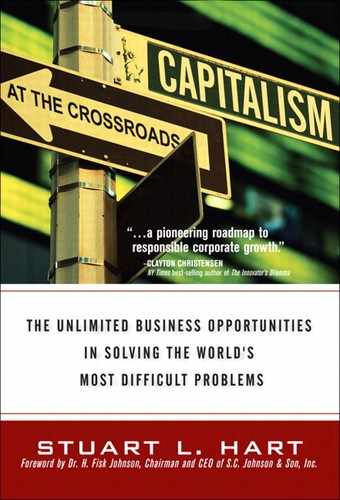Foreword
For those of us unwilling to stick our heads in the sand like an ostrich, Stuart L. Hart’s new book gives voice to an inescapable reality: that the corporate sector can be the catalyst for a truly sustainable force of global development for all on the planet.
As the chairman and CEO of a consumer products company with global operations, I see every day the value that business can bring. I see that its products can improve the health and safety of people around the world. I see that its jobs enable parents to support their children, and allow children to achieve dreams not even imagined by their parents.
I also recognize that business has provided fuel for the growing antiglobalization outcry. But despite what some see as the inevitable stain of “progress,” I know there are many business leaders who share my belief that you cannot purely pursue greater profitability every quarter and have that be an acceptable mission statement. Or that improving the lives of workers in one country while degrading the environment in another is an unacceptable demonstration of civic responsibility. Short-term quarterly profits cannot trump long-term sustainability.
As the author makes clear in Capitalism at the Crossroads, there is no inherent conflict between making the world a better place and achieving economic prosperity for all. Maintaining a principled commitment to global sustainability is not a soft approach to business—it is, in fact, the only pragmatic approach for long-term growth.
Capitalism at the Crossroads presents a scenario in which business can generate growth and satisfy social and environmental stakeholders. By focusing on the four billion people currently at the “base of the pyramid,” Hart contends that companies can reap incredible growth while sowing tremendous improvement in people’s lives and at the same time preserving the other species that live on this planet.
Business driving sustainability is not a new concept to me. The seed was planted and then cultivated throughout a lifetime of conversations with my father, Samuel C. Johnson. He shared stories about my grandfather, who traveled to Brazil in the 1930s in search of a sustainable source of wax for our products. He described his own 1975 decision to voluntarily and unilaterally ban CFCs from our products despite fervent opposition from colleagues and competitors alike.
My father’s pioneering social and environmental efforts led to his selection as an original member of the President’s Council on Sustainable Development and as a founding member of the World Business Council on Sustainable Development. He led our family company, SC Johnson, to new heights of corporate environmental and social achievement.
Perhaps most important, my father ensured that the dialogue on sustainability would continue. In 2000, he endowed the Samuel C. Johnson Chair in Sustainable Global Enterprise, and it is this Chair that Hart now so ably and deservedly occupies. He also endowed the new Center for Sustainable Global Enterprise of the Johnson School at Cornell University. By doing so, he was fulfilling a vital obligation that Hart sets forth for business in this book: being optimistic about the future and the opportunities inherent in the global challenges we face.
I share that optimism. That is why in 2001 our company unilaterally developed the Greenlist™ environmental classification system to institutionalize the selection of environmentally preferred raw materials and packaging components, far exceeding government regulation and driving our business with better products. It is why in 2003 we launched programs to attack the menace of malaria in sub-Saharan Africa and the misery of asthma among Hispanic children in Miami. It is why in 2004 we joined with Conservation International’s Carbon Conservation Program to help save one of the world’s most critically threatened hotspots of biodiversity. Yet we still are in the early stages of truly addressing “base of the pyramid” products.
Optimism underlies all the arguments in Capitalism at the Crossroads, and the author presents us with a call to optimistic action. He asks us to involve the full range of stakeholders in crafting solutions to the issues of sustainability. He demands that we embrace a new business paradigm built not on incremental change, but on creative destruction and reinvention. He challenges us to base our policies and businesses on the unassailable truth that shareholder value can be created while solving social and environmental problems.
Some might say linking “global business” and “sustainable development” is an oxymoron, but they would be sorely mistaken. All of us are tied together: the radical environmentalist and the corporate CEO, the Sudanese refugee and the British socialite, the U.S. factory worker and the Argentine farmer. We all share a stake in the future of our global environment and economy. That is the undeniable truth of Capitalism at the Crossroads: We are all fundamentally linked, dependent on the same finite resources and driven by the same hopes for ourselves and our children.
I steadfastly believe there is honor and value in business. In Capitalism at the Crossroads, Stuart Hart demands that we embrace that truth. I’m convinced this may well be the best opportunity global businesses have to ensure their long-term sustainability. And I am tremendously optimistic about the future.
Dr. H. Fisk Johnson
Chairman and CEO
S.C. Johnson & Son, Inc.
